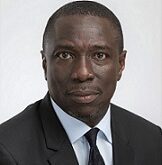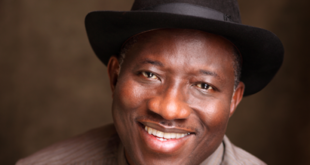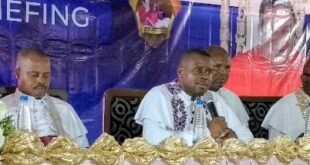“You can have these,” says Professor Fidelis Okafor, handing me over a gift of two books and a glossy magazine entitled Mantras of Hope and Footprints in the Sands of Time, and COOU Times respectively. I quickly flip through the pages, nodding my head.
The last time we met was over a year ago at Awka, Anambra State, during the annual conference, Literary Philosophia, held in his honour. Lest you forget, he is a philosopher with literary inclinations. Above all, he is the Vice Chancellor of Chukwuemeka Odimegwu Ojukwu University, Igbariam, Anambra State (formerly Anambra State University).
Mantra of Hope is a collection of poems by graduating students of the English Department 2010/2011 of the university, edited by Ngozi Chuma-Udeh, celebrating his remarkable wit and administrative acumen. “Though this poetry book is on me, the Association of Nigerian Authors allowed them to perform some of them at the ANA convention in Abuja in 2011,” he tells me with tremendous admiration for his students. The other publications chronicle his records as a high flier.
We are seated in front of his house off campus at Igbariam. A gigantic statue of the Virgin Mary stands in the center of the house under a roof where masses are held. He is a devout Catholic and wears humility like a holy ensemble. Birds dart about on tree tops in the house, and the well matted grasses shine in the midmorning sun. No doubt, he is at home with nature.
Globally, we are in the era of e-banking, e-music and e-library. I want to find out whether Nigeria is fully ready to embrace e-book. He touches the rim of his glasses, and says cryptically, “Why not?” He explains further, “We are used to riding all sorts of vehicles. There are no sorts of vehicles you find in Europe and America that you won’t find in Nigeria, and we embraced them. So, why not e-library? That is the in-thing now and, of course, the NUC demands you ought to have it as a condition for accreditation. Everything has gone electronic. People can now do their research through their mobile phones.”
He has a point there, yet, with the evolution of social media, many people, especially Nigerian youths have turned their backs to the book while paying more attention on Facebook, Whatsapp, Snapchat, Instagram, and the like. So, if you say the e-book is the future of learning, how do today’s youth make headway when the distractions of social media seem to have won the battle?
He concedes, “The first problem is that the culture of going to the library is dying away. In our own time, we spent more time in the library. Today, it is not everything you get on your telephone. Certainly, not. Take for instance, legalpedia in the Faculty of Law (a software) you can find current judgments from across the world, and it is not something that some individuals can afford to have. It is a specialized area.
“Just as we have the conventional library, the same as e-library; just as we encourage our students to go to the library, even when you have the e-library, the conventional library is still very important, because you can go and touch the book and read it. When you are reading the book, you are reading the print; you are reading the author, and that makes it very interesting. So, you can’t do away with the book. All over the world, the book will still be there; the e-library will be there; the social media will be there, too –they will all have to be there and complementing one another.”
A major talking point in Nigeria now is the downturn in the national economy. Is the economy affecting the knowledge industry in the country, as well? He answers in the affirmative. “Of course, education is part and parcel of the larger entity called society, so what affects one affects the other,” he begins. “For instance, if you budgeted 10 billion naira for education, and the 10 billion has depreciated in terms of the disbursements –and we are experiencing it now – for the funds provided by, say, TETFUND or the Ministry of Education for the buildings going on in the universities, some contractors are complaining, because they have to spend more.
“Automatically, you find that education is affected. What we do is to continue to ginger them to keep the projects, and they are in agony on how to do it. So, you can see that a bad economy affects education directly or indirectly. Of course, we rely on school fees, especially those of us in state universities, to augment the subvention, and, if the parents are affected by bad economy and their salaries have also suffered because of inflation and the students will not be able to pay school fees as when due, and if they don’t pay school fees, it will affect the university in terms of running the university. So, you can see it has a bandwagon effect.”
That reinforces the recent spate of calls for the Federal Government of Nigeria to invest in the creative industry as a way of rebasing the economy. Does he think arts and culture can make all the deference? He concurs, “First of all, you see that tourism is fetching some countries a lot of money, and people from the western worlds are not coming to see skyscrapers here, because they have it –better ones. So, what attract people to a place are nature and cultural abstracts, cultural wares, displays, materials, games, and many more. Sometime ago, the Umuoji people in Anambra State used to hold masquerade festivals, and people came from all parts of the world to watch it. So we have lost interest and focus for such things. I believe that the revival of these things will also help in attracting foreign exchange to us.”
Of course, there is a creative angle to leadership. The vice chancellor tells me about his leadership style, “One is for you to understand that you are there to serve, and not paying lip service to that word ‘service’, because, from service, you get served. If you genuinely believe and act like a servant, you will not have a problem. It will modify, direct and tailor whatever you do as a servant, not as a master. So, being a servant, you are there to serve the people, and you know that those people who we regard as servants are really the masters, because you are serving them. And you try to find out what their needs are –genuine welfare needs; problems both collective and individual.
“The other level is having a plan of action and a direction: ‘this is where we are going; this is what we want to achieve; so lets all our efforts be geared towards achieving those objectives’. If you don’t have focus and objective, you will derail. If it is an academic goal, you have to specify it, high standard, dedication of lecturers to duty, ensuring that the students are getting the best in the class, ensuring that the students are getting their lectures and seem to be working hard and, hence, eliminating the danger and temptation of waiting to look for expo during examinations. If that is our goal, then we move towards that direction. And anything that we find that will impede our objectives, we deal with it.
“Therefore, a lecturer who doesn’t attend lectures or engages in any form of malpractice will be dealt with. Also, people working must have the right environment to work. So, you must also be thinking of conducive atmosphere, which also makes the staff to work and be happy. You have also to take into account the welfare of the students. In my own case –the students discovered that I am a vice chancellor of the university community, which includes the staff and students. The students have equal say. If the students are not there, the lecturers won’t be there. We are there for the students.
“So, I also find time to attend to them just like a typical father will not stop the students from coming to him and listen to their problems. And that also provides peaceful atmosphere, because when the students also know they have an outlet, and you can listen to them, it minimizes tension, which can explode if you don’t know it. Above all, I also believe that whatever one is doing, by excluding God, you may not succeed, for God also plays His own role in the life of an individual and also that of a university community. So we believe in prayer –the university community prays every year, asking for God’s guidance and counseling.”
He has been the vice chancellor for three years now. What does he expect to achieve in addition to what he has done already? “I think we are talking about consolidation, and we will inject more. I think the university community will also answer the question, because they are also the beneficiaries in every aspect of my administration. My predecessors have done very well, because every good vice chancellor will always want the person coming after him to do better, though circumstances may not be the same. Every predecessor will always want his successor to even do better. A house built seven years ago is not the same now.
“Everybody works in accordance with his or her circumstance. We have done so much to improve on what we saw on the ground before I came. My dream will be that the university will become –let me not be too ambitious –one of the ten best universities in Nigeria and Africa. And we have started towards that direction. We moved very high up in the ranking of universities in Nigeria, beating over twenty or more universities. So, we are advancing. Some universities are even emulating us. We are the first university, if not the only university in Nigeria, that graduated our students by the 3rd of July for a long vacation –long vacation in the sense of what we used to have in those days when students would go and look for jobs and make some money and return to school.
“We have been able to achieve it this year, and our students have been on more than two months of vacation. Also, our students, on graduation, go to youth service the same year. We are setting the pace, and others are watching us. We hope by the time we complete our tenure, the university will be one of the top five in Africa,” says the literary philosopher matter-of-factly.
 PH Mundial – Port Harcourt Online Newspaper News Across The Region
PH Mundial – Port Harcourt Online Newspaper News Across The Region




